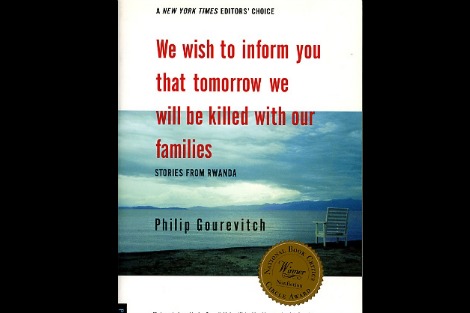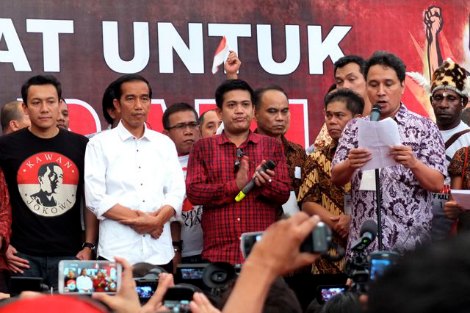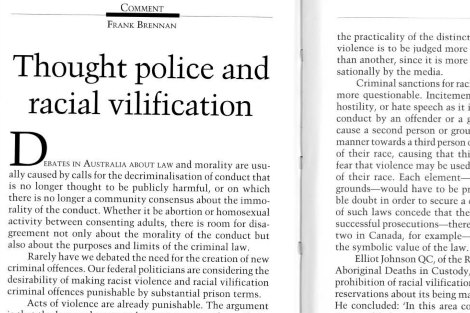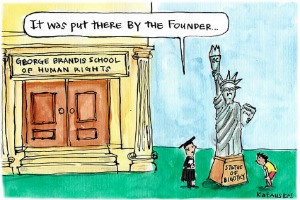Keywords: Freedom Of Speech
There are more than 200 results, only the first 200 are displayed here.
-

AUSTRALIA
- Frank Brennan
- 22 September 2014
5 Comments
Considering my indebtedness to the two Aborigines who met [my family's ship arriving in Hervey Bay from Ireland] 151 years ago, I owe it to all my fellow Australians to agitate these issues of law, morality and politics here in Ireland so that back in Australia, the homeland which, in my religious tradition, was known as the Great South Land of the Holy Spirit.
READ MORE
-

AUSTRALIA
- Andrew Hamilton
- 14 August 2014
4 Comments
Last week's legislative flurry was very messy, with few signs of reflection on what kind of a society we want to create, and how far particular legislation will help do so. The arguments for legislation are based on abstractions such as free speech and terrorism. They are not supported by sustained reflection on the way in which human beings interact.
READ MORE 
-

INTERNATIONAL
- Moira Rayner
- 08 August 2014
4 Comments
Quite rightly the Section 18C repeal bill was seen to remove all limits on ‘freedom of speech’ without regard to the vulnerability of those targeted. Andrew Bolt was infuriated, Senator Brandis lost face and his new Human Rights Commissioner Tim Wilson was ‘disturbed’ by the bill being shelved. But the PM is a pragmatist.
READ MORE 
-

INTERNATIONAL
The day after the result of Indonesia's presidential election was announced, I joined crowds of excited Indonesians in central Jakarta to celebrate Jokowi's election as Indonesia's seventh president. Did you see the rainbow? asked a supporter. I hadn't, but even if the heavens had opened and soaked everybody to the skin, it would have been taken as another sign that God too had voted for Jokowi.
READ MORE 
-

AUSTRALIA
- Andrew Hamilton
- 19 June 2014
28 Comments
Many Australians, myself included, believed that the Federal Budget was unfair. So Treasurer Joe Hockey's recent speech in defence of its fairness offers a welcome challenge. Hockey is right to insist that fairness can co-exist with gradations of wealth within society. But fairness is incompatible with gross disparity of wealth because the concentration of wealth in the hands of few people and corporations destroys equality of opportunity.
READ MORE 
-

AUSTRALIA
- Michael Mullins
- 28 April 2014
9 Comments
In South Sudan, hate speech broadcast on a local FM radio station earlier this month led to the slaughter of hundreds of innocent civilians in a massacre based on ethnicity. Local UN officials are now calling on authorities to 'to take all measures possible to prevent the airing of such messages'. Meanwhile in Australia, the Government is attempting to give legal sanction to the kind of hate speech that incited to the South Sudan massacre.
READ MORE 
-

ARTS AND CULTURE
- Barry Gittins and Jen Vuk
- 11 April 2014
Journalist Masha Gessen describes the members of Pussy Riot as 'Putin's ideal enemies'. In recent months, their nemesis has hosted the Olympics, taken control of Crimea and clamped down on media. For a group born out of 'the repressions of a corporate political system that directs its power against basic human rights', Pussy Riot still has much to roar about, even if its signature 'punk prayer' sounds more than ever like a plea.
READ MORE 
-

MEDIA
- Frank Brennan
- 11 April 2014
5 Comments
In 1994, a year before the Parliament enacted the present section 18C of the Racial Discrimination Act, I wrote in Eureka Street: 'At this time, in this part of the world, thought-police armed with criminal sanctions are not the answer' to racial discrimination. Senator Brandis has now circulated a proposal to amend the existing provisions. What he has produced is the racial hatred law you have when you don't want a racial hatred law.
READ MORE 
-

AUSTRALIA
- Frank Brennan
- 11 April 2014
1 Comment
'Whether or not we have a bill of rights, much of our human rights jurisprudence remains partial, failing to extend rights equally to all. Once we investigate much of the contemporary discussion about human rights, we find that often the intended recipients of rights do not include all human beings but only those with certain capacities or those who share sufficient common attributes with the decision makers. It is always at the edges that there is real work for human rights discourse to do.' Frank Brennan's Blackfriars Lecture
READ MORE
-

AUSTRALIA
How ironic that, even as Attorney General Brandis ensures the rights of 'bigots', the rest of us find our own rights under threat. Liberal state governments continue to roll out laws that affect the more marginalised and less privileged among us. Victoria's new 'anti-protest' laws and Queensland's 'anti-bikie' laws threaten public protest and assembly, which for most of us is how we exercise our freedom of expression.
READ MORE 
-

CARTOON
- Fiona Katauskas
- 26 March 2014
6 Comments
View this week's offering from Eureka Street's award winning political cartoonist.
READ MORE 
-

MEDIA
- Ellena Savage
- 21 March 2014
13 Comments
Andrew Bolt's response to Q&A's airing of accusations of racism was surprising. While no human is immune to emotional distress, it seems excessive for a man whose career has taken him to the edge of defamation laws to publicly wither under his opponents' attacks. This matter brings to light the discord between Australian conservatives' rhetoric about liberty and free speech, and the reality their policies and opinions impose.
READ MORE 